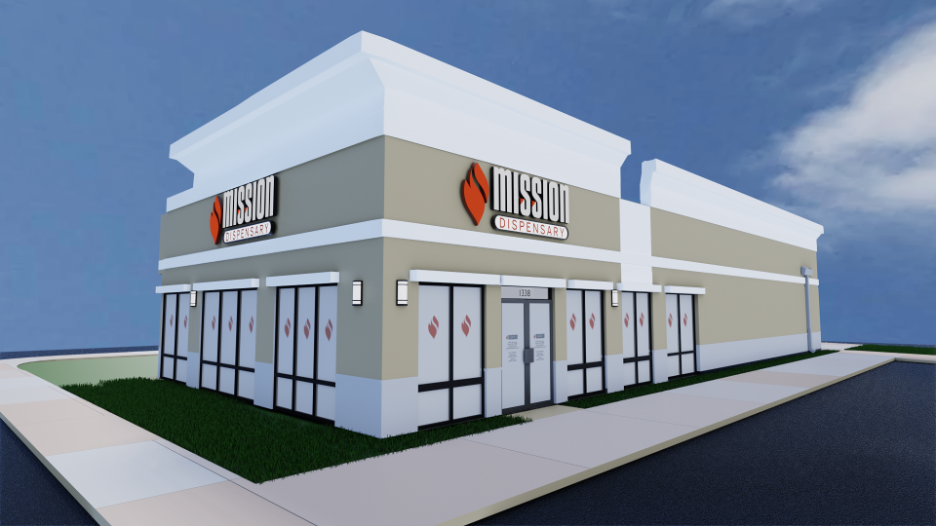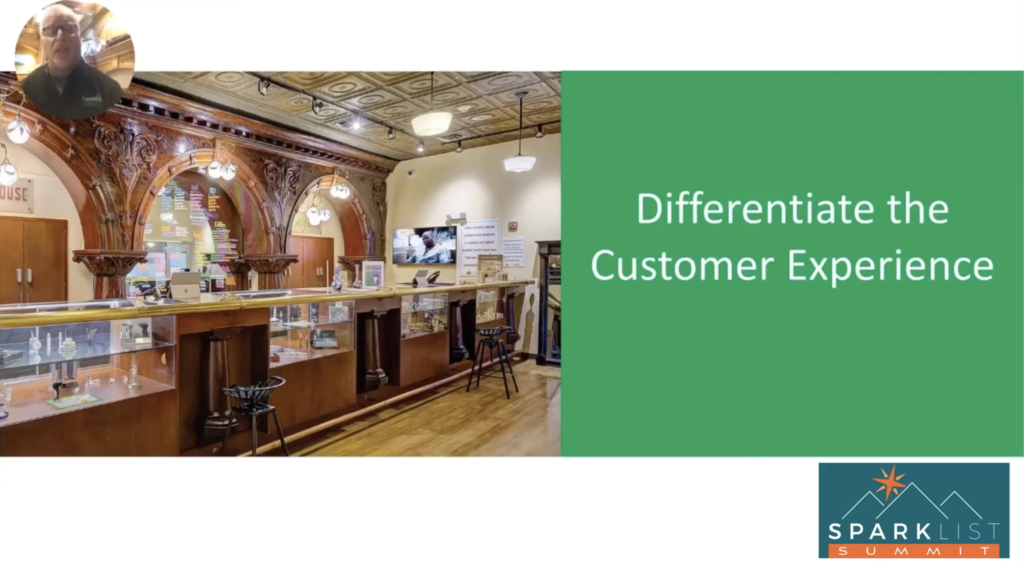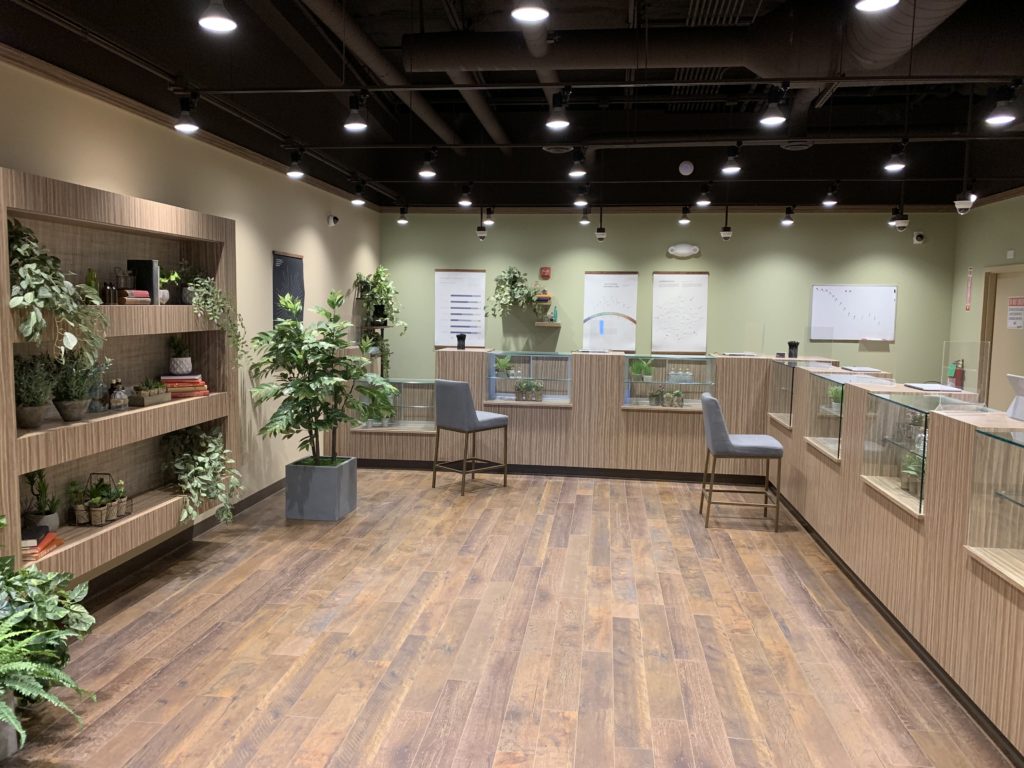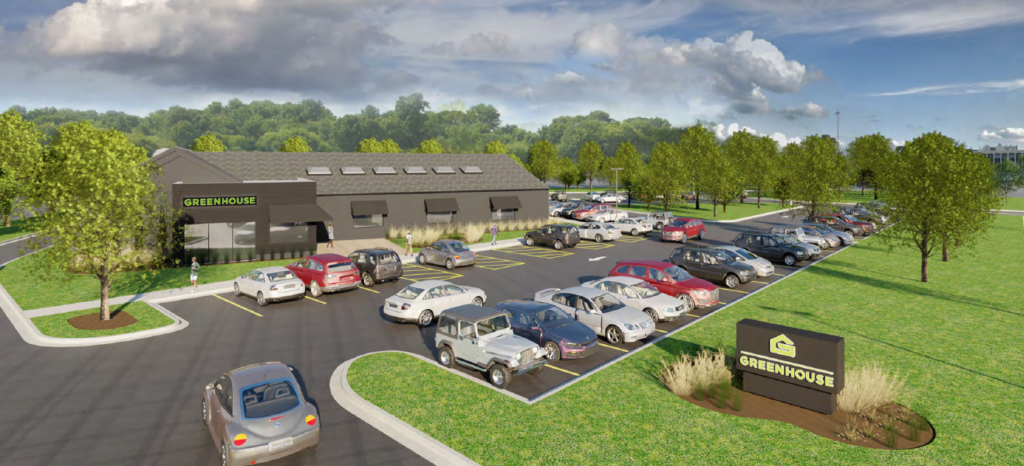Category: Illinois
Cannabis Facility Construction Transforms Distressed Tinley Park Restaurant Property into Recreational Cannabis Dispensary
Cannabis Facility Construction (CFC), a national, full-service, cannabis design-build construction firm, is proud to announce the completion of the Ascend Tinley Park dispensary for Ascend Wellness Holdings, Inc. (AWH). This adult-use cannabis retail project is one of 14 dispensaries CFC has constructed for AWH including locations in Chicago’s Logan Square neighborhood and an upcoming dispensary in Cincinnati, OH.
Cannabis Facility Construction Lends Insight and Expertise at 4/20 Event
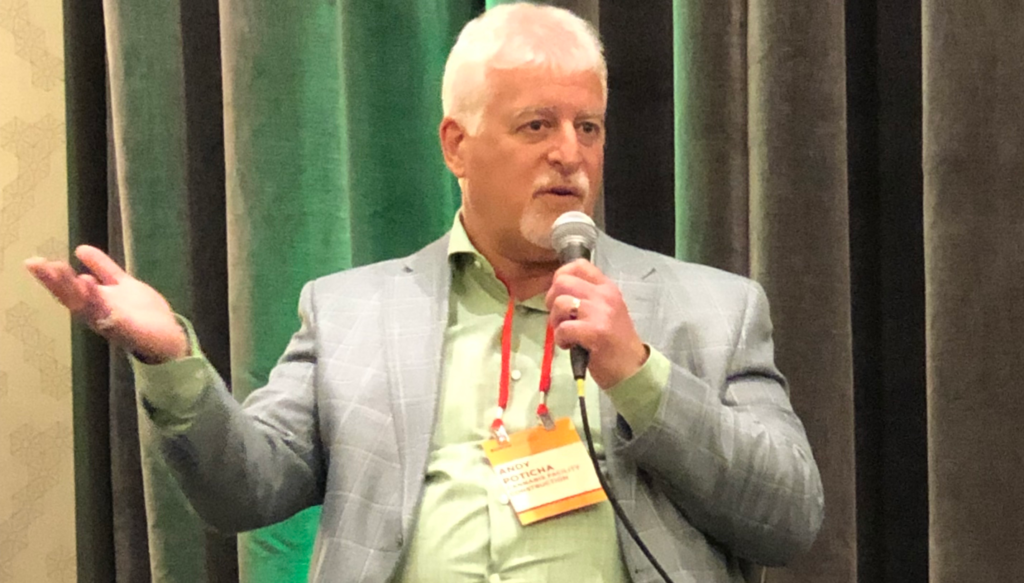
4/20 was an amazing day to celebrate the cannabis industry at the Bisnow National Cannabis Real Estate Summit in Chicago.
Cannabis Facility Construction‘s Founder and CEO Andrew Poticha was a part of an informative panel discussing “The Business Of Cannabis: An Analysis of The Green Behind the Grass,” a state-by-state compare and contrast on investment, technology, and more!
And, you can listen to the audio recording here:
You can watch a video of the event HERE
Here are a few key insights Andy shared at the event:
“Experience is key. You don’t have to break the bank on the costs to build your facility if you think through the experience that you want your client to have in the space. You can be creative with paint and lighting.”
“As more states become adult use, the security aspect is becoming more like a bank experience where there are guards and there are cameras, but they are discreet and don’t interrupt the client experience.”
“When it comes to green design, such as low carbon footprint, it can be as costly because cannabis facilities are dependent on such large amounts of resources like electricity and water. Where we can make a difference is by using efficient components and resources so that we use less. One of the things that is going to come up is using GMP, good manufacturing practice, which will be important going forward.”
“Our function as designers is to get inside our clients’ heads and articulate for them that which they can’t do themselves by asking the right questions and probing the operations discussions that generate the design. Client experience and operation is critical for not only dispensary but also cultivation. You really need to listen to your cultivation team when it comes to their recommendation on operations and be able to scale up or down depending of your cultivation facility.”
“Soon we may see people in consumption lounges sipping on an infused beverage just like you might enjoy a good Scotch. We should all be thinking about what the experience should be in those spaces, and we simply don’t know the answer to that yet.”
“Keep your eye on HVAC no matter what you are considering in your cultivation facilities. The plant is so sensitive that even one degree of temperature and 1% of humidity variation can affect the quality of the harvest. You have to get your HVAC strategy right, and keep your eye on the final product.”

Illinois created a cannabis industry mess. Here’s how to begin cleaning it up.
OPINION: Andy Poticha calls on state lawmakers to grant universal extensions to give new cannabis entrepreneurs, who are already under tight deadlines and facing pandemic-related supply chain shortages, more time, flexibility and the certainty to launch their business and leverage high quality resources. Poticha asks the state to make amends for its own delays and treat new cannabis entrepreneurs as the business partners they are, important future generators of significant tax revenue for Illinois and leaders in the cannabis industry.
Read more in Crain’s Chicago Business here (requires log-in) OR reach out to us at info@cannabisfacility.net, and we can share the full article with you.
Construction Plan and Prepare
Cannabis Facility Construction (CFC) recently partnered with the Illinois Craft Cannabis Association–ICCA to share insights into the construction design/build for members in preparation for the cannabis license awards announcement.
Construction Plan and Prepare was an educational webinar outlining what cannabis growers can do now to prepare for the build-out of their location. Topics covered included Design/Build vs Design-Bid-Build; Designing and Building for Efficiency, Flexibility, Safety, and Security; Time and Cost to build your cannabis facility; and Who’s the right cannabis contractor for you?
Cannabis Facility Construction Starts Construction on New Mission Dispensaries Location in Calumet City, IL
Latest Project Represents Multiple Projects with 4Front Ventures in IL, MI and MA
CHICAGO, IL (SEPTEMBER 23, 2020) – Cannabis Facility Construction (CFC), a national, full-service, cannabis design-build construction firm based in Northbrook, IL, is excited to announce the start of construction on a new Mission Dispensaries recreational and medical dispensary for 4Front Ventures Corp. in Calumet City, IL.
“As their preferred design-build partner, Cannabis Facility Construction has delivered multiple dispensaries for 4Front Ventures in Ann Arbor, MI, Georgetown, MA, and on Chicago’s South Side,” said Andy Poticha, Principal at Cannabis Facility Construction. “We value our continued relationship and are excited to revitalize this new building and create a beautiful space with great street presence in Calumet City.”
Construction on the new dispensary, located at 1330 Torrence Avenue, across from River Oaks Center in Calumet City, commenced in early September and is expected to be complete by mid-December.
This new location for the brand offers plenty of parking and approximately 3,000 square feet of finished retail space, back office space for processing, a secure, oversized vault for substantial inventory storage, and a highly advanced security system.
According to Robert Spence, Director of Facilities at Mission Dispensaries, “Cannabis Facility Construction has been an incredibly collaborative partner during the construction process, working seamlessly with our team on the design and zoning process on this and multiple projects across the country.”
A leader in serving the construction needs of the cannabis industry since 2015, Cannabis Facility Construction has built more than 30 cultivation centers, processing laboratories and retail dispensaries customized for the needs of medical and recreational cannabis clients in ten different states.
For more information on CFC or to connect with principals Andy Poticha, Ira Singer, and Mike Frazin, please visit www.cannabisfacility.net.
Avoiding Common Construction Mistakes as a New Cannabis Licensee
Cannabis Facility Construction Principal, Andy Poticha, spoke last month at the inaugural Sparklist Summit, hosted by Supercritical. Illinois applicants and cannabis industry stakeholders learned about “Avoiding Common Construction Mistakes as a New Cannabis Licensee.” Listen here to the video.
https://www.youtube.com/watch?v=QBY9XpRTH4M&feature=emb_title
Building Your New Dispensary: Avoiding Common Design-Build Mistakes as a New Licensee
So you’re planning a new cannabis dispensary – congratulations! Whether this dispensary is your entrepreneurial dream come true or you’ve been down this road before, once you confirm your license, you’ll want to begin building out your location as quickly as possible. Our teams, currently building dispensaries across Illinois and other States, can help steer you through the unique maze that is the cannabis construction process.
Building a new dispensary is not as simple as it sounds. Dispensaries must offer the security of a bank branch, the compliance of a pharmaceutical company, and the aesthetic of a high-end retailer.
As experts in the design-build construction of cannabis facilities, our teams have been in the trenches building dispensaries, cultivation centers and processing labs since 2015, including a national flagship dispensary in Northbrook, currently under construction. We have been involved in more than 30 dispensary, cultivation center and processing lab projects in nine states since 2015. Currently, we are leading renovation projects that offer more than 35,000 new square feet of cannabis cultivation and dispensaries customized for the needs of both medical and recreational cannabis customers.
Here are a few ways you can jump ahead of the curve:
Differentiate the customer experience. Buying cannabis in a regulated dispensary should feel easy, welcoming and natural. Designing for the customer experience, creating welcoming sales environments, while remaining compliant with regulations, is where dispensaries differentiate themselves from the competition. One reason this is so important: with strict supply chain rules in place, many cannabis products are highly commoditized. If your product is a commodity, the customer experience becomes even more important.
Prioritize compliance or suffer the consequences. To maintain product supply and operational retail sales, stick to strict protocols and carefully follow building codes related to the handling, storage and distribution of cannabis throughout the supply chain. In Illinois, building code inspections are unique to each municipality, with enormous differences from one community to another. Be sure your design-build construction partner knows the right questions to ask, and the pitfalls that could come up at each inspection milestone.
Use a design-build approach. Design-build integrates your design and construction teams from the beginning, reducing surprises and streamlining your budget throughout the process of envisioning and construction your dispensary. When your architect and contractor are working together, you’ll find you have more time to focus on running your cannabis business, with less time spent in meetings about your space. In addition, a design-build model allows for a single point of accountability. At CFC, we use our four-step design-build process to ensure alignment and high-touch customer service throughout your project.
Your contractor shouldn’t be learning on the job. Your design-build construction partner should be respected in the industry and be able to speak to ‘tales from the trenches.’ While legalized recreational cannabis may be new to Illinois, there are companies like us that have been building for both medical and recreational cannabis for many years. You should never have to hear ‘let’s learn this together.’
Don’t let the pandemic get you down. As an essential business, construction has been building cannabis facilities throughout the COVID-19 shut-down period and continues today. With the right protocols in place, there’s no reason the construction of your dispensary can’t press forward. To understand more about how our crews stay safe, you can read our National Cannabis Industry Association (NCIA) blog post from June 2020 on how to expand or renovate your cannabis facility while observing social distancing.
Choose a contractor with experience. For nearly five years, CFC has worked with numerous cannabis companies, including vertically integrated multi-state operators (MSOs). “Partnering with CFC, we have been thoughtful about connecting the design/build process with our customer experience and compliance objectives,” said Mitch Kahn of Greenhouse Cannabis. “Together, we identified and solved potential issues early in the design/build process, so that the build-out is supportive of sales, security, and being good neighbors in our communities.”
Need more resources on the design-build dispensary construction process? Here are a few suggestions:
NCIA PODCAST:
https://thecannabisindustry.org/podcasts/cannabis-facility-design-and-construction/
KNOW BEFORE YOU GROW:
https://rejournals.com/know-before-you-grow-secrets-of-successful-cannabis-facilities/
KEY SUCCESS FACTORS:
While cannabis continues to be a fast-paced industry with changes on a daily and weekly basis, it’s no longer brand-new. There’s no reason you shouldn’t have a guide who knows the right questions to ask and can keep you from repeating mistakes of the past.
For more information on working with our Cannabis Facility Construction experienced teams, you can request a consultation here and one of our team members will get back to you immediately.
Cannabis Facility Construction Commences Construction on New Flagship Greenhouse Dispensary
NORTHBROOK, IL – Cannabis Facility Construction (CFC), a national, full-service, cannabis design-build construction firm based in Northbrook, Illinois, is pleased to announce the start of construction on a new recreational and medical cannabis dispensary for Greenhouse. Located at 755 Skokie Boulevard in Northbrook, IL, the new dispensary will be a national flagship location for the brand, offering almost 10,000 square feet of finished space.
“As their preferred design-build partner, CFC has delivered multiple dispensaries for Greenhouse over the past five years in various states across the country,” said Andy Poticha, Principal at Cannabis Facility Construction. “We are now especially excited to have this opportunity to build their largest flagship location right here in our own backyard.”
Construction commenced in May, revitalizing the site and its surrounding area that had been vacant for quite some time.
The location’s sleek, modern, industrial design will represent a new look for the Greenhouse brand. An open floor plan with high vaulted ceilings, skylights, abundant natural light, and easy-to-browse product displays will complement the wood and masonry structure. To create a differentiated and welcoming customer experience, careful consideration has been given to both customer traffic flow and the reality of social distancing. The design ensures all points of sale are six feet apart so transactions take place with proper social distancing in mind and create a sense of ease.
In addition to the retail space up front, there will also be back office space for processing, a secure, oversized vault for substantial inventory storage, and a highly advanced security system throughout.
CFC’s work complements exterior infrastructure improvements happening simultaneously to revitalize the surrounding area with the addition of natural landscaping, a retention pond, large parking lot, and new turn lane from Skokie Boulevard.
A leader in serving the construction needs of the cannabis industry since 2015, Cannabis Facility Construction has built more than 30 cultivation centers, processing laboratories and retail dispensaries customized for the needs of medical and recreational cannabis clients in nine different states.
Illinois Recreational Cannabis: What You Need to Know

“In the interest of equity and criminal justice reform, I look forward to signing this monumental legislation,” said Illinois Governor, J.B. Pritzker, following the passage of House Bill 1438 on Friday, May 31, 2019. The 66-47 vote made Illinois the 11th state to legalize adult-use cannabis and the first to do so through the state legislature. Vermont’s program was approved through its legislature but does not permit commercial sales. Approval in other states occurred via referendum.
The bill, which passed 38-17 in the state Senate two days earlier, focuses on social equity and addressing Illinois’ financial deficit. Chicago Crain’s Business reports that, “Illinois expects sales to eventually reach $1.5 billion to $2 billion a year, producing $500 million in revenue for the cash-strapped state.”
Following the November, 2018 midterm elections, we commented on what Governor Pritzker’s election victory would portend for the future of cannabis in Illinois. Once he signs the bill, it will be the law of the land.
Here’s what you need to know about the new law:
Growing and Selling
Recreational sales will begin on January 1, 2020, with priority given to businesses with current medical licenses. They will be eligible to start cultivating, producing, and selling cannabis for retail use.

According to the Chicago Tribune, “Only the 20 existing licensed medical marijuana cultivation facilities will be licensed to grow it initially. Next year, craft growers may apply for licenses to cultivate up to 5,000 square feet, with preference given to applicants from minority areas disproportionately affected by the war on drugs, such as the South and West sides of Chicago. Medical marijuana dispensaries and new retail stores will be licensed to sell it.”
Buying
The bill allows for Illinois residents 21 and older to possess up to 30 grams or roughly one ounce of cannabis flower or bud. They are also allowed five grams of cannabis concentrate or 500 milligrams of THC in a cannabis-infused product. Adults visiting the state can possess up to 15 grams of cannabis. Growing plants at home will remain illegal except for certified medical patients.

Impact on Convictions
Central to the bill was the expungement of cannabis convictions.
“While the usage of cannabis has been the same across all racial groups, the actual incarceration charges have been shown to be seven times more likely for people of color than Caucasians,” said Illinois State Senator. Heather Steans (D-Chicago), the Senate bill’s main sponsor. “This bill is going to set the model, I believe, the gold standard, for how to approach social equity issues related to cannabis legalization.”
Here’s what’s at stake for convicted felons, according to the Chicago Tribune: “The governor will pardon past convictions for possession of up to 30 grams, with the attorney general going to court to expunge or delete public records of a conviction or arrest. For possession of 30 to 500 grams, an individual or a state’s attorney may petition the court to vacate and expunge the conviction, but prosecutors may object, with a judge to make the decision.”
Taxation
Per ABC News and the Chicago Tribune, consumers will be taxed in the following way:
- A 10% tax will be levied on cannabis products containing less than 35% THC
- 20% for cannabis-infused products like edibles
- 25% for THC concentrations of more than 35%
Additional state and local taxes apply and can be as high as 9.75%, including:
- 3% municipality
- 3.75% county in unincorporated areas
- 3% in Cook County (Chicago)
Opting In or Out
Similar to other adult use programs, local governments may opt in or out. According the Chicago Tribune, “Municipalities and counties may ban cannabis businesses within their boundaries, but may not ban individual possession. Any person, business or landlord may prohibit use on private property. Colleges and universities may continue to prohibit marijuana use.”
Where You Can and Cannot Consume
Usage at home is permitted as long as it’s out of view of the public. Places where use is strictly prohibited include: public areas, school grounds, in any motor vehicle, in a correctional facility, around someone under 21, while driving a boat or flying a plane, or by a school bus driver, police, fire or corrections officer while on duty.What Else?
Cannabis remains a Schedule 1 illegal drug by the federal government; however, federal law enforcement tends not to prosecute possession of small amounts or businesses complying with state programs.
Medical cannabis was also a winner at the eleventh hour of the legislative session. The House passed the bipartisan SB 2023, which will make the Compassionate Use of Medical Cannabis Pilot Program Act permanent while broadening its scope. Illinois State Representative Bob Morgan’s (D) reauthorization bill removes the program’s July, 2020 sunset and adds more patient qualifying conditions, including chronic pain and autism.

The bill also permits advanced practice nurses and physician assistants to recommend medical cannabis in addition to physicians and increases the number of caregivers that patients can use to access the program. Similar to the adult-use program, the reauthorization bill emphasizes equity standards and will award five dispensary licenses to ensure equal opportunity.
“It is critical for the state that the pilot program be reauthorized and revised,” said Morgan in a press release. “The initial program placed a significant regulatory burden on patients. With the passage of SB2023, the new program will streamline the process and help patients suffering from debilitating medical conditions.”


